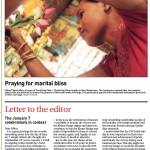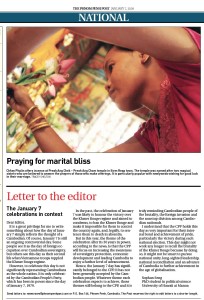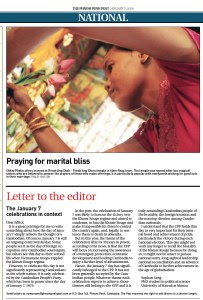Culture
now browsing by category
Chuon Nath’s vision of the Khmers
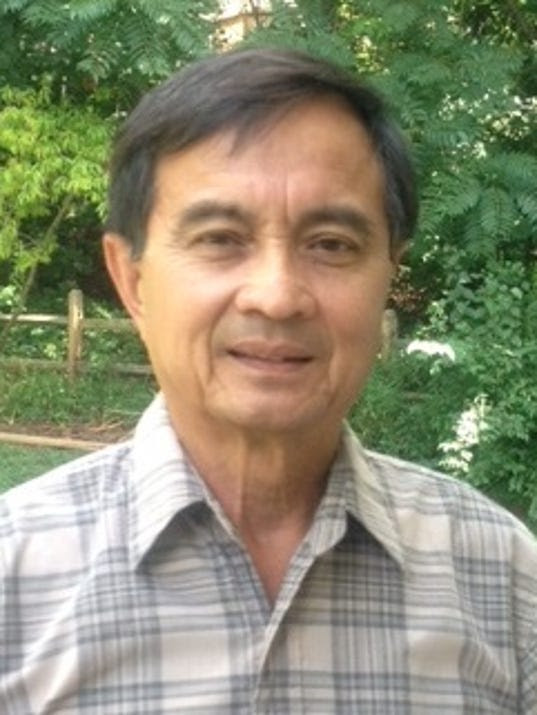
Peang-Meth(Photo: PDN file)
Watching the snow piles that line streets and parking lots here, refusing to melt in the cold winter sunshine, my thoughts wander to Ypao Beach where more than a decade ago I swam, watching the coconut leaves dancing against the backdrop of a blue sky, and to decades earlier when I sat on the floor with my father to hear the Buddhist sermon broadcast on state radio.
Now in my seventies, I still hear the Buddhist preaching, “There has to be evil so that good can prove its purity above it.”
In this world of blame and denial, I am more than ever attracted to the words of French Renaissance statesman Michel de Montaigne: “There is no man so good that if he placed all his actions and thought under the scrutiny of the laws, he would not deserve hanging ten times in his life.” And to the words of one of my favorite American presidents, Theodore Roosevelt: “There is not one among us in whom a devil does not dwell; at some time, on some point, that devil masters each of us. … It is not having been in the Dark House, but having left it, that counts.” Roosevelt counseled, “Do what you can, with what you have, where you are.”
————–
PACIFIC DAILY NEWS
Be thoughtful and imaginative
The son of Khmer farmers in Kampong Speu, Chuon Nath grew up to become a Buddhist monk, an author, a composer, a poet and the head of a Khmer Buddhist reformist movement, the Dhammayuttika Nikaya, a model of Buddhism that relies on reason and intellectual conception as valid bases for action and belief. This “rationalist-scholastic model” influenced young Khmer monks in the early 20th century during France’s colonial rule in Cambodia.
Revered as “probably the most famous and most knowledgeable monk Cambodia had ever had,” Chuon Nath became an ardent protector of the Khmer identity, culture and history, and a conservator of the Khmer language. In 1948, at age 65, he was elevated to be the kingdom’s supreme patriarch of the Maha Nikaya with the title Samdech Preah Moha Sumetheathippadei (“wise lord”) Chota’nhea’nor Chuon Nath, a de facto leader of Khmer Buddhism.
A “master of Khmer literature,” Chuon Nath’s innovations included printed sacred texts (replacing hand-inscribed palm-leaf writings), the translation of Buddhist Pali canon into the Khmer language, the introduction of Khmer Buddhist monks to higher learning in Pali and Sanskrit studies, the modernization of Buddhist teaching methods. In 1915 (at age 32) Chuon Nath became a member of the committee by the Kingdom’s royal order to compile a Khmer dictionary.
Leadership in Local Politics of Cambodia by CDI
Leadership in Local Politics of Cambodia: A Study of Leaders in Three Communes of Three Provinces
By Thon Vimealea, Ou Sivhuoch, Eng Netra and Ly Tem
CDRI–Cambodia’s Leading Independent Development Policy Research Institute CDRI Working Paper Series No. 42
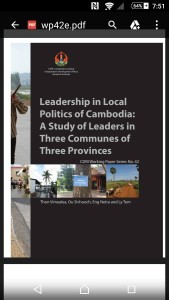 What is leadership? How does it constitute and shape local politics? How is leadership understood and practised in the local context? Do changes in the institutions of local government affect the way leadership is perceived, understood and practised? Do they bring demands for different ways and styles of leadership and perhaps different leaders? How is leadership gendered and is this changing? This chapter aims to provide a relevant framework within which to discuss the empirical data relating to these questions. It begins by discussing important concepts that shape leadership—power, authority, and legitimacy – as explained and defined in international literature, including classic social science. From a look at these concepts, we would be able to identify who has power, what kinds of power they have and who exactly has power to influence the agenda; how those in power exercise their authority, whether they have the necessary legitimacy to do so, and what kinds of legitimacy they have and need.
What is leadership? How does it constitute and shape local politics? How is leadership understood and practised in the local context? Do changes in the institutions of local government affect the way leadership is perceived, understood and practised? Do they bring demands for different ways and styles of leadership and perhaps different leaders? How is leadership gendered and is this changing? This chapter aims to provide a relevant framework within which to discuss the empirical data relating to these questions. It begins by discussing important concepts that shape leadership—power, authority, and legitimacy – as explained and defined in international literature, including classic social science. From a look at these concepts, we would be able to identify who has power, what kinds of power they have and who exactly has power to influence the agenda; how those in power exercise their authority, whether they have the necessary legitimacy to do so, and what kinds of legitimacy they have and need.
Since cultural context has a far-reaching effect on the functioning of power and authority, and therefore also leadership, the chapter then discusses particular cultural forms in south-east Asia. In particular, we discuss how patron-client networks influence political leadership in Southeast Asia and shape how leadership and governance are practised and perceived in these countries; and how such practice and understanding of political leadership have changed or transformed amidst political and economic transformations as a result of globalisation and a trend towards more democratic rule. In reviewing local leadership in Cambodia, different domains of power and their relevance to Cambodia’s current political context, especially under decentralisation, are discussed before looking at general and specific literature on gender in leadership.
Political Paradigm of Pragmatism from the Khmer Youth part 47
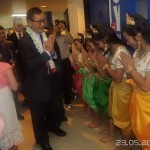
This part (47), Mr. Sophan Seng has continued to analyse on the political tension between Cambodian People’s Party (CPP) and Cambodia National Rescue Party (CNRP). Focusing on the weak national institution or lacking of political institution for the nation, the current shape of Cambodia political landscape is remained fragile. Though, political figures ie Somdach Hun Sen and HE Sam Rainsy have jointly established “Culture of Dialogue” to avoid further dividing according to Khmer proverb said “Tide up, fish eat ant; water recess, ant eat fish”. But this new approach is not enough to bring about change, and it has been fragile as the state’s political institution basing on the “Rule of Laws” has not been established.
Question on independence of three branches: Executive, Assembly, and Court implementing in a civilized state, how does it work as Member of Parliament must serve as Minister appointed by a winning party? In practice, Canada’s Minister couldn’t monopolize power or reshuffle the Ministry at all as those technicians and expertise are remained in position protected by the Law; or whenever Minister is changed or transferred, those expertise are fully respected in the same posts. For the Minister themselves, if they got less votes among their party’s rival/candidate within their constituent, the Minister Post shall also been affected.
This is contradictory to Cambodia that Members of Parliament are bordered by province boundary which is larger than ability of each MP to oversea it. More than this, MP Candidacy is appointed by party without conducting election to be chosen within their circle at all.












